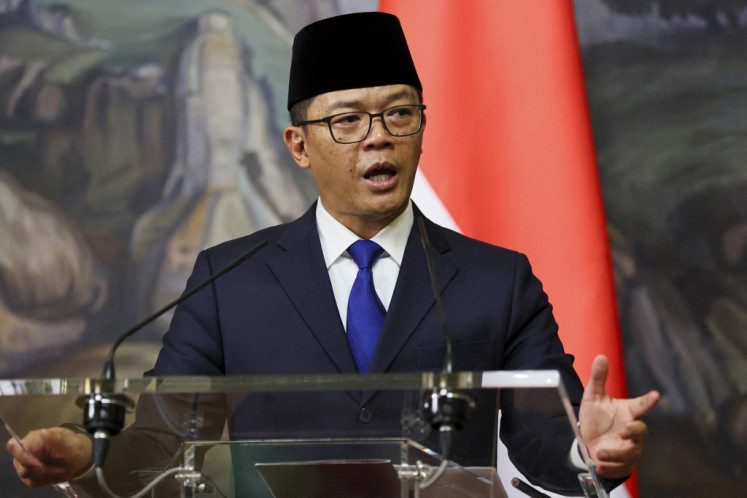Popular Reads
Top Results
Can't find what you're looking for?
View all search resultsPopular Reads
Top Results
Can't find what you're looking for?
View all search resultsReducing smoking curbs cancer: Nobel winner
A US scientist says various kinds of cancer are linked to smoking, therefore cancer risk assessments need to focus on reducing tobacco consumption
Change text size
Gift Premium Articles
to Anyone

A
US scientist says various kinds of cancer are linked to smoking, therefore cancer risk assessments need to focus on reducing tobacco consumption.
Harold Elliot Varmus, the winner of the 1989 Nobel Prize in Medi-cine, said a person’s genetic predisposition for cancer was small compared to the enormous cancer risk from smoking or tobacco consumption.
“Genetic research is a means to develop [cancer] therapy. In some cancers, such as colon cancer, breast cancer, thyroid cancer, renal cancer and several others, the genetic risks are less strong, compared to lifestyle behavior,” Varmus told The Jakarta Post here on Monday
Many kinds of cancer, especially lung cancer, were absolutely linked to smoking, he added. “The effort to diminish tobacco use, if it can be done, is very important to control cancer in Indonesia.”
Varmus, the director of US National Cancer Institute (NCI), made his comments after a lecture on the genetic basis of cancer at the University of Indonesia’s (UI) medical school.
During the lecture, which was sponsored by the US embassy, USAID Indonesia launched its Partnerships for Enhanced Engagement in Research (PEER)-Health Indonesia progam, a US$770,000 initiative to enhance public health research in Indonesia.
Ratna Sitompul, the dean of UI’s medical school, said that non-infectious diseases, including cancer, had become more common in Indonesia, while at the same time the nation was struggling against infectious illnesses.
“We need to conduct a lot of research to uncover why a particular cancer is affecting patients. Some of the viruses we are now dealing with can cause cancer. By learning about the differences between the biodiversity of the two countries, we may get some answers on how best to fight cancer,” Ratna said.
According to the central government’s 2010 Basic Health Research Report (Riskesdas), 63 percent of adult men in Indonesia smoked. A large number of children, some under 5, also smoked, the report said.
Although the smoking rate for Indonesian women was low compared to other parts of the world, it has been growing rapidly.
The report also said that 4.3 of every 1,000 Indonesian people were afflicted by cancer.
“There’s a very high incidence of tobacco smoking in the country,” Varmus said.
According to Varmus, even in the US, which had dramatically reduced its number of smokers, 20 percent of the population continued to smoke, ignoring evidence that smoking led to cancer, respiratory diseases and cardiovascular illnesses.
“I know there is an opposition to tobacco control, but I believe we need to take bold preventive steps on tobacco use,” Varmus said.
Tobacco consumption is one of three major factors to assess a person’s risk for cancer, along with the presence of Human Papilloma Virus (HPV), which is the leading cause of cervical cancer, one of most prevalent forms of cancer afflicting Indonesian women.
Varmus said there were now many ways to try to combat cervical cancer, such as, among other things, early detection of the disease using pap smears in addition to vaccination.
A HPV inoculation program initiated by the local chapter of the Indonesian Obstetricians and Gynecologists (POGI) in Denpasar, Bali, a year ago, met with a cool reception, which was attributed to the Rp 3.6 million price tag for the 3-shot vaccination program.









